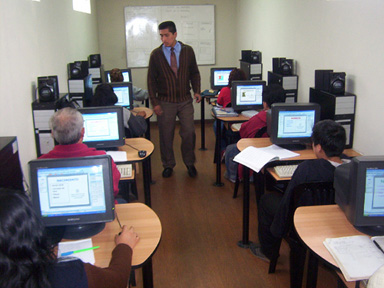Coverage

Global Literacy: Peru
August 18, 2008
HotChalk
Lima, Peru's capital city, had a problem with far-reaching consequences for its economy. Its impoverished residents in outlying areas couldn't afford the travel costs for computer training that might help them get jobs.
The solution: Deliver computer training by bus. With state-of-the-art computer equipment and high-speed Internet access, 25 mobile classrooms make the rounds of some of the city's poorest neighborhoods. Instructors from local technical community colleges have donated their time, teaching computer skills to half a million youth and thousands of adults since 2005. A business/education partnership makes the innovative program, called MuniNet, possible.
HotChalk spoke to the brains behind MuniNet--Josè Carlos Carvajal, senior advisor for the Municipality of Lima. Carvajal manages digital literacy programs for k-12 students and disadvantaged populations in the city of 8 million.
"The main challenge is to get technological training to those who live far from the city center," Carvajal said through a translator. "Lima is trying to bring the solution to the people."
Carvajal was in Kona, Hawaii, to receive an award for his work from computer skills training and certification company Certiport in August. The Utah company, which develops international computer skills standards, honored six people worldwide for their digital literacy efforts. Over 40% of Peruvians are very poor, making transportation to computer classes and Internet access out of reach for many. The majority of the 27 million residents don't use computers at all, Carvajal said. There are some government efforts to put computers in schools, but only 10% of k-12 schools currently have them. With 9 million k-12 students and over 50,000 schools in Peru, the ration of students per PC is 250 to 1. The effects on the South American nation have been serious.
"The use of technology has developed a new kind of social exclusion in Peru," Carvajal said. "That kind of social exclusion results in over 70 percent of people not having opportunities to improve their lives." Although Peru has widespread poverty, its economy shows promise at the same time. It has trade agreements with the U.S., China, Canada, Singapore, and the European Community, and domestic income from exports is increasing, Carvajal said.
"That kind of environment creates more challenges for our professionals," he said. "The Peruvian people need to be prepared." Technology can reduce the amount of time for Peruvians to get the required skills to compete internationally, he states, and the country needs to continue its growth while also maintaining political stability. "The main challenge of our country is to make our economic growth sustainable based on democratic government."

MuniNet's tech education-on-wheels is a key piece of that effort. The buses, with a bright blue and yellow MuniNet logo, are open from 8 am to 10 pm every day so students can take training and practice on computers when it's convenient. They attend two-hour training courses three times a week for four months, taking exams to receive Certiport credentials at the end of that period. An estimated 60,000 Lima residents will complete training and earn credentials this summer. Other Peruvian cities will follow Lima's example. Pleased with MuniNet's success, states Carvajal, the Peruvian government has announced plans to expand it throughout the country.
"The MuniNet program has not only grown but truly accelerated digital inclusion," said David Saedi, CEO of Certiport in a statement following the conference. "By expanding the program nationwide, Mr. Carvajal has helped empower thousands of Peruvians to earn credentials that validate their ability to compete on the world stage."
There are two things, Carvajal states, that Peru needs to achieve future economic success: A population with technological skills and the commitment of citizens to improve their own lives. It will take more than what the most effective bureaucracy can do to accomplish both. "That kind of project or vision is not just about government. It includes the heart and soul of the people," Carvajal said.